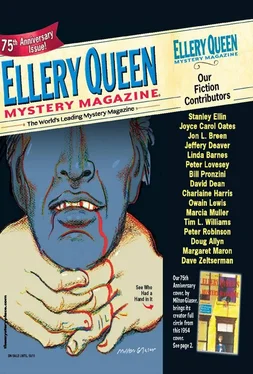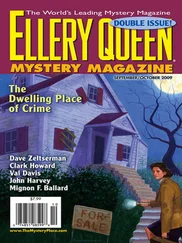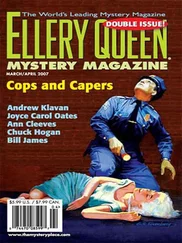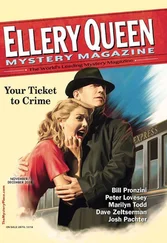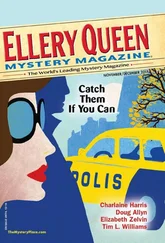Джеффри Дивер - Ellery Queen’s Mystery Magazine. Vol. 148, Nos. 3 & 4. Whole Nos. 900 & 901, September/October 2016
Здесь есть возможность читать онлайн «Джеффри Дивер - Ellery Queen’s Mystery Magazine. Vol. 148, Nos. 3 & 4. Whole Nos. 900 & 901, September/October 2016» весь текст электронной книги совершенно бесплатно (целиком полную версию без сокращений). В некоторых случаях можно слушать аудио, скачать через торрент в формате fb2 и присутствует краткое содержание. Город: New York, Год выпуска: 2016, ISBN: 2016, Издательство: Penny Publications, Жанр: Детектив, на английском языке. Описание произведения, (предисловие) а так же отзывы посетителей доступны на портале библиотеки ЛибКат.
- Название:Ellery Queen’s Mystery Magazine. Vol. 148, Nos. 3 & 4. Whole Nos. 900 & 901, September/October 2016
- Автор:
- Издательство:Penny Publications
- Жанр:
- Год:2016
- Город:New York
- ISBN:0013-6328
- Рейтинг книги:3 / 5. Голосов: 1
-
Избранное:Добавить в избранное
- Отзывы:
-
Ваша оценка:
- 60
- 1
- 2
- 3
- 4
- 5
Ellery Queen’s Mystery Magazine. Vol. 148, Nos. 3 & 4. Whole Nos. 900 & 901, September/October 2016: краткое содержание, описание и аннотация
Предлагаем к чтению аннотацию, описание, краткое содержание или предисловие (зависит от того, что написал сам автор книги «Ellery Queen’s Mystery Magazine. Vol. 148, Nos. 3 & 4. Whole Nos. 900 & 901, September/October 2016»). Если вы не нашли необходимую информацию о книге — напишите в комментариях, мы постараемся отыскать её.
Ellery Queen’s Mystery Magazine. Vol. 148, Nos. 3 & 4. Whole Nos. 900 & 901, September/October 2016 — читать онлайн бесплатно полную книгу (весь текст) целиком
Ниже представлен текст книги, разбитый по страницам. Система сохранения места последней прочитанной страницы, позволяет с удобством читать онлайн бесплатно книгу «Ellery Queen’s Mystery Magazine. Vol. 148, Nos. 3 & 4. Whole Nos. 900 & 901, September/October 2016», без необходимости каждый раз заново искать на чём Вы остановились. Поставьте закладку, и сможете в любой момент перейти на страницу, на которой закончили чтение.
Интервал:
Закладка:
Jon L. Breen’s contributions to EQMM began in 1967 when he debuted in our Department of First Stories. In 1977, he took over as EQMM’s regular book reviewer — a position he occupied for thirty-some years. For his fiction, the California author has been short-listed for the CWA best-novel Dagger and won Macavity and Barry awards in the short-story category. For his critical work and reviews he’s won the Edgar, Anthony, and Ellen Nehr awards. His vast knowledge of the mystery comes into play in this story revolving around EQMM’s first issue.
Speaking as one who lived through the entirety of the twentieth century and can remember most of it — Sebastian Grady is my name — I have a lot of stories to tell. In fact, I’ve been jotting them down for years. The time most people want to hear about for some reason is World War II. Not hard to understand, I guess. For anybody who lived through it conscious and aware, whether in battle or looking for battle or trying to avoid battle, on the home front or in foreign parts, retired or a child in school, it was in some way a defining event. But the story I’m going to tell is not about World War II. It’s about a pool party I went to in Beverly Hills on Sunday, November 30, 1941, one week before the attack on Pearl Harbor, and a murder that took place in the days between. An officially unsolved murder that apart from its propinquity to Pearl Harbor might have become as notorious as the William Desmond Taylor case.
What should I say to give you a context for our last week without war? To begin with, for a country without war, we sure acted like we were at war. The military draft was in effect for young men, though forty-plus fellows like myself felt safe. The news we heard on the radio and read in our papers was dominated by what was happening on the European and Asian battlefronts. Plenty of Americans were already in it, including some American pilots helping Chiang Kai-shek’s Chinese government protect the Burma Road from Japanese attack. The great football player Byron “Whizzer” White played his last pro game and announced he’d enter the armed forces. It seemed inevitable we’d be in the war eventually — President Roosevelt was even quoted as predicting we’d be in it by the following Thanksgiving — and people were already speaking in terms of what would happen and what could be accomplished after the war was over.
So was Southern California at war that Sunday morning, November 30? Hardly. We were looking forward to the big USC-UCLA game next Saturday at the Coliseum, though it didn’t mean any more than crosstown bragging rights that year, and after that the opening of the races at Santa Anita. And, of course, we were planning for Christmas, buying our presents, maybe making plans to trek down to Huntington Beach to see the seasonal decorations on the oil derricks later in the month. Then, as now, the merchants were whipping us into a frenzy of pre-yuletide excitement with their ads. Each night second-line celebrities accompanied Santa Claus in his ride down Santa Claus Lane, known the rest of the year as Hollywood Boulevard — come see the parade and a dollar purchase from a Boulevard merchant would get you three hours of free parking. We had all the Christmas accoutrements but the snow.
As I walked the flagstone path through a neatly barbered lawn to the front door of producer Max Ferguson’s house, palatial by any reasonable standard but just average for Beverly Hills, I certainly wasn’t thinking about the war. I was thinking about champagne, a lavish brunch buffet, and good talk. Literate as producers go, Max usually invited a lot of writers to his parties, and they always had the best stories.
Mrs. Ferguson, the former Alice Whitney, who’d screamed her way through a score of B Westerns and horror pictures before retiring to a more rewarding life at age thirty, greeted me at the door.
“Seb, darling, so pleased you could come! Greta said you and she had a lovely time at the Brown Derby the other night.” No, not Greta Garbo. The Greta who would become my second wife was a close friend of Alice’s, but I won’t hold that against her. “You know, there may be rain later, so we moved half the party indoors. You can sit around the pool or join some of the other guests in the library. Drinks available at both locations.”
A voice from behind her said, “I’d opt for the library, Seb.” Max Ferguson, who was older than he looked, maybe early fifties, had a Johnny Weissmuller physique, just right for pool parties but all wrong for the Hollywood-producer stereotype. Offering me a large hand to shake, he said conspiratorially, “Consensus is the talent around the pool is below average.”
“You men are terrible,” Alice said. “If Max had his way, we’d be hosting orgies.”
“But only for a moral purpose, dear, like in DeMille’s old pictures,” Max replied. The smirk she gave appeared not entirely good-natured.
I followed my host and my nose to the smoke-filled library. Most rooms were smoke-filled in those days. Fortunately, the books were protected on floor-toceiling glassed-in shelves. There were no matched sets chosen for pretty but all sorts of books on all sorts of subjects, most nonfiction but including virtually complete works of Ellery Queen, S.S. Van Dine, and a few other detective writers.
As I entered, I saw a couple of screenwriters of my acquaintance at the center of a circle of their colleagues. Sherry Kendall and Gus Fischburn were apparently inseparable best friends who kept up a sometimes entertaining and sometimes wearisome crosstalk, as if they were a frustrated vaudeville act. Sheridan Blessington Kendall, to give him his full byline both on screenplays and slick-magazine stories about a small-town mayor, was red-faced and portly. Gus Fischburn was smaller and skeletally thin, a comedy writer who claimed he once worked for the Marx Brothers. Gus and Sherry were both in their late forties, and they’d known each other for years. Sherry waved me over. On the way, a jacketed on-the-ball servant handed me a glass of champagne.
“Did you hear about this, Seb?” Sherry said. “A.P. Windsor is no more. Just like that, they split up the team. I don’t know how those two guys worked together all those years anyway.”
“Total mismatch,” said Gus Fischburn. “Phil Devine’ll do better on his own. I always figured he was the talent of the pair.”
Sherry agreed. “Can you imagine having to work day after day with Aaron Wimbush, that preening, conceited jackass?”
“And those are his good points,” said Gus.
“Hope I didn’t make a mistake,” said Max Ferguson with a sly expression.
“What do you mean?” I asked.
“I invited them both here today. I’d hate to have an ugly scene.”
“Nonsense, I’ve seen your pictures, you love ugly scenes,” said Gus. “But Phil won’t make one. Rumor hath it he’s got a new deal, finally out from under Wimbush’s thumb, a happy man. He just says to himself, to Aaron is human, to forgive Devine.”
“You never wrote for the Marx Brothers,” said Sherry.
“And you couldn’t write cough-drop copy for the Smith Brothers.” I wondered if they rehearsed this stuff.
The conversation veered in different directions, mostly Hollywood gossip. But inevitably, they got around to the impending war. A younger scripter named Jeremy Glass expressed nervousness about the draft, and several of his colleagues assured him his nearsightedness, unhealthy pallor, and slightly effeminate manner would assure his escape. For these guys, insults served many functions, even giving comfort. On a more serious note, some seemed to be worried about air attacks on the West Coast, though not half so worried as they’d be a week later.
Читать дальшеИнтервал:
Закладка:
Похожие книги на «Ellery Queen’s Mystery Magazine. Vol. 148, Nos. 3 & 4. Whole Nos. 900 & 901, September/October 2016»
Представляем Вашему вниманию похожие книги на «Ellery Queen’s Mystery Magazine. Vol. 148, Nos. 3 & 4. Whole Nos. 900 & 901, September/October 2016» списком для выбора. Мы отобрали схожую по названию и смыслу литературу в надежде предоставить читателям больше вариантов отыскать новые, интересные, ещё непрочитанные произведения.
Обсуждение, отзывы о книге «Ellery Queen’s Mystery Magazine. Vol. 148, Nos. 3 & 4. Whole Nos. 900 & 901, September/October 2016» и просто собственные мнения читателей. Оставьте ваши комментарии, напишите, что Вы думаете о произведении, его смысле или главных героях. Укажите что конкретно понравилось, а что нет, и почему Вы так считаете.
